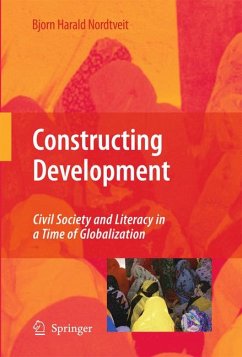Informed by detailed quotations from interviews with local people involved in a World Bank literacy project in Senegal, the author demonstrates how a project is entangled in the global economy, and how it constructs development through a discourse of gender equity, growth of the civil society, and promotion of the use of private provision of social services.
Nordtveit's new analytical methodology claims it is necessary for all development initiatives to first investigate whether the donors' vision of development coincides with national - and local - notions of development. Only then can the holistic and complex interrelations between the project and all other development desires and services in the community be studied. Finally, the project's cost effectiveness must be considered. The author also examines the strengths and weaknesses of 'public-private partnerships', which are being used ever more frequently by donor agencies to implement social services.
Constructing Development is a tour de force. Going back and forth between the global and the local, it examines a World Bank women's literacy project in Senegal through a critical and integrated discussion of education and development, globalization, gender, civil society, and privatization. Nordtveit offers an insightful and innovative critique of development theory and practice, drawing on new authors and fields, such as Complexity Theory. His book is a must read across a numberof fields including comparative and international education, adult education, gender studies, and economic development.
Steven J. Klees, Former President, Comparative and International Education Society Harold R.W. Benjamin Professor of International and Comparative Education University of Maryland
Dieser Download kann aus rechtlichen Gründen nur mit Rechnungsadresse in A, B, BG, CY, CZ, D, DK, EW, E, FIN, F, GR, HR, H, IRL, I, LT, L, LR, M, NL, PL, P, R, S, SLO, SK ausgeliefert werden.









